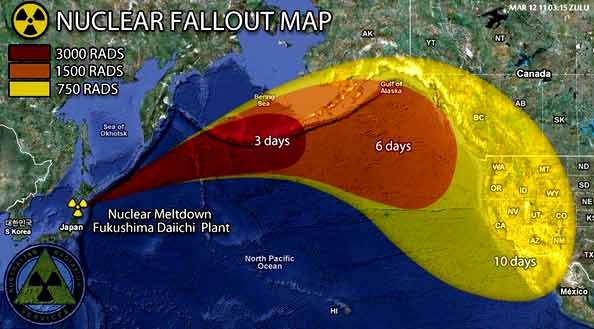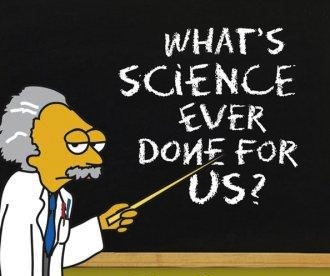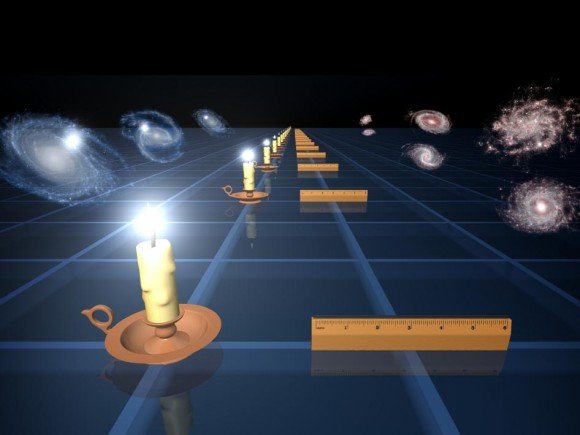"If there is anything that a man can do well, I say let him do it. Give him a chance." -Abraham Lincoln
It was nearly four years ago that I started blogging back at my old site, branching out from the hardcore research of physical cosmology and the teaching of physics and astronomy, and into what I think of as science communication.
And there have been a number of very curious things I've learned, some of which I expected and some of which caught me by surprise.
The least surprising: the entirety of our experience in this world is something that practically all of you have a drive to understand. From the origins of the Universe to the far distant future, from the tiniest subatomic particle to the largest scales of the cosmos, from the formation of the elements to the biological and social evolution of human beings: this is how you make sense of the world. And you really do; you want it to make sense! This is, in my experience, not just for a handful of people; for a huge fraction (almost all) of you.
My philosophy about communicating the specialized knowledge that I have, the whole time I've been doing this, has been to focus on trying to give you an awareness and an appreciation for both what we know and how we know it. You don't need to become an expert yourself, and I think it would be foolhardy for me to attempt to put you through the rigorous work that doing so entails. (I think, if I did that, you'd almost all likely leave!) It is far less important to me that you can, say, calculate the expansion rate of the Universe at any given point in its history, than it is for you to know how the Universe is expanding, and how we discovered just what its expansion rate is, throughout history.
Sometimes, you may be very happy to learn a new detail that fits neatly into your overall picture of how things work; at other times, you may be faced with a difficult dissonance to overcome, as the new information is incompatible with the prior picture of the Universe. In this case, there's usually a strong instinct to say that the new information is wrong, or flawed, or that something is rotten in the state of Denmark. And it is all too easy to dismiss something that is unpleasant, even when it's right.

(Like why the effects of gravity and light-emitting matter get separated when galaxy clusters collide.)
But that's what nearly all of you strive for: a harmonious picture where you have as accurate as possible an understanding of not only what happens, but how it happens. And you want your understanding to be as accurate a mirror for the actual reality of things as it can be.
Well, for that, you need to either have sources of information that you know are trustworthy, or access to experts in all sorts of fields who can help you sort out what's actually scientifically true from what isn't. Because no one can be scientifically literate in all aspects of all fields of science simultaneously: there's simply too much.

(Yes, even everyone in this picture didn't know it all. I'm looking at you, Einstein, Curie and Lorentz!)
The more we learn about the world, the harder it becomes for any one individual to distinguish what's actually correct from what gets promoted as scientific truth, but really isn't. It becomes more difficult to know what news items present valid, sound scientific information, and what's tentative, speculative, flawed or highly dubious. And it isn't your job to check up on every claim in every single report you read. That's not your job, not that you'd have enough time to do that for every article even if it was!

(I'm looking at you, faster-than-light neutrinos.)
So what do you do? I don't just mean about physics and astronomy, I mean about everything science related. When the Fukushima plant suffered from the earthquake & tsunami earlier this year, how did you separate the actual news about it from the alarmism? How did you separate out the accurate assessments of risk from those in denial that radiation was actually bad for you?

(It's not like if you went to Noor's List you got a nuanced, informed take on it.)
But there's so much more. What about the link between XMRV and Chronic Fatigue Syndrome?
Is there a connection between vaccines and autism?

("She told me," Bachmann said, "that her little daughter took that vaccine, that injection, and she suffered from mental retardation thereafter.")
You might be informed about these topics or you might not, but I guarantee you that there are plenty of topics out there where you think you're informed, but your information isn't nearly as solid as you might believe. And there should be a resource out there to help you separate the wheat from the chaff.
Ideally, at least from my point of view, there would be a news outlet that catered to exactly this. There would be a place where one could go for not only the latest and most important issues, but for a scientifically accurate, appropriately nuanced take on those issues.
On what we know and how we know it. On what the confidence we have in those results is. Where the scientifically inaccurate reports are culled out, whether they come from the Huffington Post or the Wall Street Journal, and the most accurate, scientifically sound information is promoted to the forefront, whether it comes from Nature, NASA, or a little-known blog like we are.

(After all, we were the first and possibly only source to break the story of how the James Webb Space Telescope's budget was sabotaged by the US Government!)
Well, this is important. This is something I care deeply about, and this is something that doesn't yet exist. The best thing we've got going right now is to either sift through a giant news aggregator (like google news) and cut out the sources you dislike, or to create an RSS feed of all the sources you like best.
But different sources are better for different issues, and what was a good source on global climate change may not be a good source on the link between cancer rates and power lines. And then, if that source gives you a report on an asteroid likely to hit Earth, is it reputable?

(And if the source has a picture of Bruce Willis instead, does that make it more or less reliable?)
Well, since Labor Day, I've been working on a number of projects related to science education, communication and outreach. And I'll continue working on them, just like I'll do my damnedest to keep putting out the amazing quality articles you've come to expect here. Hopefully, there won't even be a drop in the frequency with which I write and post them!
But today, I start a new project as well. There's a new startup company that's attempting to fill that niche: to be a quality, real-time news service that gathers all the articles on a topic from around the web and focuses on choosing articles based on the quality of the science in their science and health sections.
That's right, not on traffic, or prestige, or the number of potential pageviews, or on the advertising dollars it can bring in, but on the quality, accuracy and reliability of the article in question. Because it's your Universe, your world, and your life, and you deserved to have the best and most honestly accurate information out there at your fingertips.

(Actually, I'd prefer accurate and precise, but I'll settle for simply being honest about what the data actually indicates!)
When I heard about this project, and I thought about how I could contribute to it, about how much I know about finding, analyzing, and discerning accurate information, as well as helping communicate it, I couldn't say no. So I start, today, as the head editor of their science and health sections. My job will be to build and develop these sections, as well as creating featured collections on different topics, and working with the other members of this company to create as useful a resource as possible. Over the next few months, I'm going to work on not only editing but curating the topics that come up. It's going to take a lot of work, because the eventual goal is to teach the software how to make these choices as to which articles are pure gold and which ones are pure rubbish, but the end goal is too great to not go for it.
So I'm going for it. And you can be sure that down the road, I'll be asking you for help in doing this right, in making this great, and in creating -- for the first time -- a place where you can go to get exclusively accurate, informative news about science, health, and any topic you choose, but without the noise, scams, and dishonest, misleading tripe that's out there. (And if you think google self-corrects itself to give you just that, you, my friend, are living in a fantasy.)
Because I want this service to exist. I want it to work, and I want it to come out working right. Not just for myself, but for you, and for everyone out there who wants a little more truth, accuracy, and honesty in their news. More details to follow soon, of course, including soliciting feedback from you, my esteemed readers, but in the meantime, I hope you keep on enjoying Starts With A Bang, and that you wish me luck in this new venture! If there's anything you'd like me to keep in mind while I start working on this, now's the time to let me know!




Congratulations! I'm launching a new science blog of my own so I'll look forward to linking back to your new site's articles. Way to go!
Ethan
Yes there is a real need for such a science news service.
Yes you will do an excellent job at it.
I wish you all the best.
Here http://bigthink.com/ideas/22827 is a relevant discussion. the title of this article is "Re-Imagining University Science Media".
This http://bigthink.com/ideas/41046 is also part of the discussion. "The Rise of Adaptive Learning". OK, this is more relevant to your physics software endeavor.
All the best in your various endeavors.
Sounds redundant - we've got the Science Channel. Come on, "Destroyed in Seconds" is on!
Seriously, that sounds awesome. Looking forward to it! Is this in addition to your own company you'd started work on? You'll be busy!
Sounds fantastic, Ethan. It's a much needed service. I just fear not enough people will utilize it.
Great idea,how about fixing it so your readers can share with others on Facebook.
Congrats and good luck on this new venture! With so much misinformation around it is excellent to have more people devoted to accurate information.
Incredible this post, I think nobody has done much the reality of things interest me travel at the speed of light, due to the recent discovery of neutrinos.
Congratulations and best of luck at the new gig.
I hope it all goes well and that you remember to link to it when it's ready to roll out.
Hopefully not too much politics, unless it's slating politicians for cutting funding of course.
Something with a similar focus recently started here in Australia.
http://theconversation.edu.au/
Yes, The Conversation is great.
Ethan is awesome.
That is fantastic. Science news will never be the same. Good luck requires lots of hard work. I know you'll be real lucky.
Sounds like it will be a lot of work, but look forward to being educated by your efforts and pointing others to them.
Thanks you much and best wishes for sucess.
Ethan,
I don't understand. Are you saying that you don't have a choice in your current blog to decide about your topics?
Or are you not content being not able to delete comments in the follow-ups?
Everyone,
Thanks for all your support! When I feel the new project is up to my standards of quality to the point where I'll be proud to show it to you, you can be certain I'll reveal it (and be very receptive to feedback) then!
Hannes,
There is an awful lot I can do on this blog, and I -- as you have noticed -- have done exactly as I please. As far as comments go, the only comments I've ever deleted were either hate speech or spam, because that's the way I do it.
But I can also do great things as part of a great team that I could never do on my own, and that's what the new project that I describe here is going to be.
Wonderful news, congrats!
I couldn't agree more with the idea of an unbiased, accurate/precise and largely consumable science news source, or your motivations to enter into it and help forge a truly holistic platform for, as you put it perfectly, science communication.
Start this thing with a bang.
I wish you all the best with your new venture, and I look forward to the day you post the link.
Cheers!
I have really enjoyed the stories on the site.
All the best in new job.
My only bad news for you is go look at Lubos site those pesky nuetrinos are still going superluminal at 2ns spacing so the rumour goes, so your bunching theory is gone. I had money on that you were right :-(
Wait I just read the climate article comments you tried to convince Lubos he was wrong ... you are a brave man :-)
So no don't go to his website I don't need world war 3 as my fault.
Hi Ethan,
congratulation!
You told that you now work for a 'company'. A company must make money with something. So I can't believe that the great idea of a "reliable info system" is not dependent from those who will pay for their matches being the first in a list - no matter about reliability. How can be earned money with such a service?
Lots of scientific articles are already behind pay-walls and thus not available to anyone - like me for example...
Cheers.
I thought Fox News already was the arbiter of The Truth. Or was it the Weekly World News? I get confused...
This sounds like a great idea, but honesty and truth to one person could be lies and deception to another. I would just ask you to err on the side of caution.
Thanks for clearing that up Ethan, because I was not sure about:
"I'm going to work on not only editing but "CURATING" the topics that come up."
"..EXCLUSIVELY accurate, informative news"
"..it isn't YOUR job to check up on every claim in every single report you read. That's NOT your job,"
- Could be interpreted differently, like Karl Heinlein above above is also aware of.
Share your excitement Ethan and look forward to following you in your new position!
Excellent news and I really hope you will be able to achieve your goal to create this new source of news.
Best of luck.
Great news! Congratulations and best of luck to you. I'm looking forward to checking out this new resource!
Interesting. Would this be focused on quality science in the news, or on all new science?
I can't wait! I know you will keep it on the right track and I applaud your vision.
However, right now it doesn't exist. So what is a person to do _right now_, in _lieu_ of such a source existing?
I just found this sight (via realclearscience.com) and have immediately come to love it! You have a new fan, Mr. Seigel - I look forward to your works going forward.
Oh yeah, Go Gators!! I left Gainesville before you got there, but brothers we are.
(I'm looking at you, faster-than-light neutrinos.)
They're ba-a-a-a-ck.
http://news.google.com/news/more?pz=1&cf=all&ncl=dwAzRglvJVTof_MKiJ9EWZ…
How very exciting! I will be one of your regular, and avid, readers. Best of luck, and thank you!